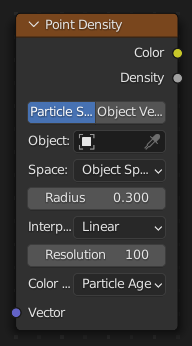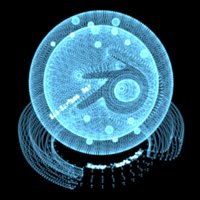Point Density Node¶

The Point Density node is available in volume shaders, to render volumetric points for each particle or vertex of another object.
Inputs¶
- Vector
Texture coordinate to sample texture at; defaults to global position (Position output of Geometry node) if the socket is left unconnected.
Properties¶
- Point Data
Where to get points from.
- Particle System
Use each particle position from the specified particle system.
- Object Vertices
Use each vertex position from the specified object.
- Object
Which object’s vertices or particle system will be used.
- Particle System
Particle positions from this system will be used.
- Space
The coordinate system for mapping points.
- World Space:
Map each point exactly where the source particle or vertex is.
- Object Space:
Fit the points from the source particles/vertices inside the bounding box of the object with the point density texture.
- Radius
Size of the points.
- Interpolation
Texel filtering type.
- Closest:
No interpolation, use nearest texel. Produces blocky looking points.
- Linear:
Interpolate linearly between texels, producing soft, round points.
- Cubic:
Use cubic falloff, producing very soft points. Useful when points are very densely packed.
- Resolution
The dimensions of the texture holding the point data.
- Color Source
Which attribute of the particle system or mesh is used to color the output.
- Particle Color Sources
- Particle Age:
Lifetime mapped as (0.0 - 1.0) intensity.
- Particle Speed:
Particle speed (absolute magnitude of velocity) mapped as (0.0 - 1.0) intensity.
- Particle Velocity:
XYZ velocity mapped to RGB colors.
- Vertex Color Sources
- Vertex Color:
Use a Color Attribute for coloring the point density texture.
Merknad
Color Attributes are defined per face corner. A single vertex can have as many different colors as faces it is part of. The actual color of the point density texture is averaged from all vertex corners.
- Vertex Weight:
Use weights from a vertex group as intensity values.
- Vertex Normals:
Use object-space vertex normals as RGB values.
Outputs¶
- Color
Texture color output.
- Density
Density of volume.
Examples¶

Domain object with Point Density texture using vertices from ball as points.¶